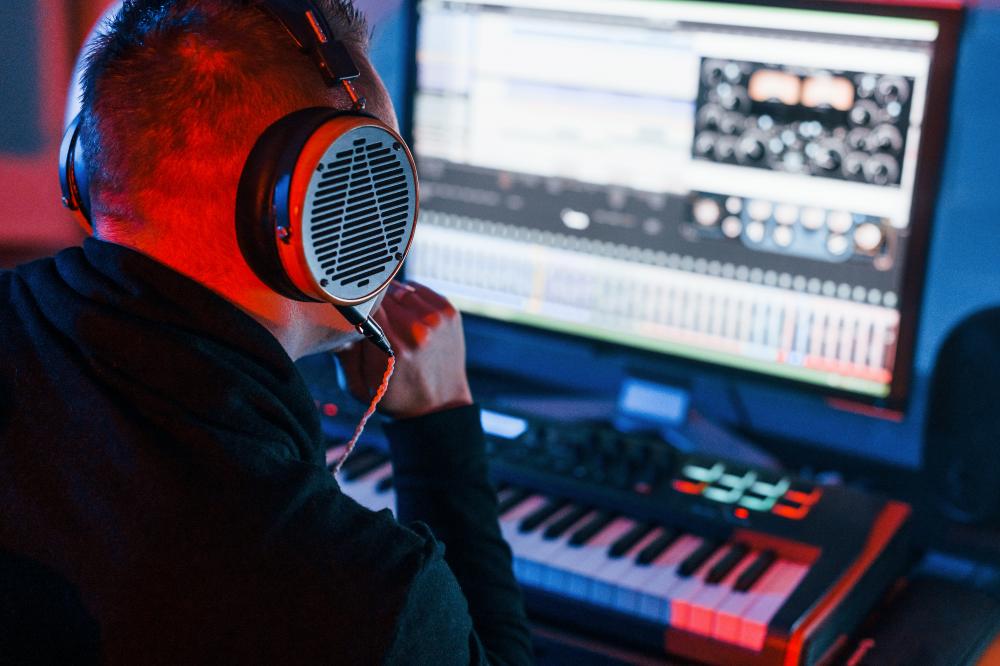
Introduction
Welcome to Music Business Producer, where our goal is to shed light on the multifaceted roles within the music industry, especially focusing on the pivotal role of music producers. If you’ve ever wondered “what do music producers do?” you’re in the right place. This article aims to demystify the role of music producers, providing insights from our experience and exploring the nuances that make this profession so critical to music production.
Understanding the Role of Music Producers
At the core of every hit song and successful album is a music producer, often working behind the scenes to bring the artist’s vision to life. But what do music producers do exactly? The role of a music producer is multifaceted, involving a blend of technical skills, creative vision, and project management. They are the architects of sound, responsible for everything from the arrangement and recording of music to its mixing and mastering.
Technical Skills
Music producers must have a profound understanding of music technology. This includes software known as DAWs (Digital Audio Workstations), various recording equipment, and the intricacies of mixing and mastering tracks. Their technical expertise allows them to sculpt and polish a song or album to commercial quality.
Creative Vision
Apart from technical prowess, what do music producers do in terms of creativity? They often help in composing and arranging music. Producers work closely with artists to understand their vision and then use their creativity to enhance and realize this vision within the music. This could mean suggesting adjustments in song structure, adding new elements to the arrangement, or even co-writing songs.
Project Management
Music production can be a complex process involving many moving parts. Producers often take on the role of project managers, coordinating schedules, managing budgets, and ensuring that the project stays on track. This oversight can include hiring session musicians, coordinating studio times, and overseeing the creative outputs of everyone involved.
A Day in the Life of a Music Producer
Each day can be vastly different in the life of a music producer, depending on the project stage. One day might be spent in pre-production, where the producer meets with the artist to discuss ideas and plan the recording process. The next day could involve hands-on work in the studio, recording instruments and coaching artists through their performances. And then there are days dedicated to mixing and mastering, where the producer works alone, meticulously adjusting levels and adding effects to ensure the final product is perfect.
The Diversity of Music Production
What do music producers do across different genres? The role can vary significantly. For instance, in electronic music, producers often create the entirety of the music themselves, using software to synthesize sounds. In contrast, a producer working on a rock album might focus more on capturing the best live performances and refining the sound during the mixing stage.
Breaking into the Industry
Becoming a music producer requires a blend of formal education, self-learning, and hands-on experience. Many successful producers have music degrees, but just as many are self-taught, having honed their skills through experimentation and practice. The key is to start small, perhaps producing for local or independent artists, and gradually build a portfolio that showcases your ability to bring out the best in the music you produce.
The Evolution of the Role
The role of music producers has evolved dramatically with technological advancements. What once required a room full of expensive equipment can now be done on a laptop with the right software. This democratization of music production has made it more accessible but also more competitive. Producers must now wear many hats, often taking on the roles of sound engineer, mixer, and even marketing specialist, to ensure their projects cut through the noise.
Challenges and Rewards
- Constant Learning: The music industry is ever-changing, and producers must continuously update their skills to keep up with new technology and trends.
- Creative Satisfaction: Few roles offer the creative fulfillment that music production does. Seeing a project through from concept to completion and watching it succeed is incredibly rewarding.
- Financial Uncertainty: It can take time to establish yourself as a producer, and income can be unpredictable. However, successful producers can find themselves in high demand.
Final Thoughts
So, what do music producers do? They are the unsung heroes of the music world, blending technical skill, creative vision, and project management to create sounds that move, inspire, and entertain us. It’s a challenging career path, but for those with a passion for music and the drive to succeed, it can also be incredibly fulfilling.
At Music Business Producer, we’re dedicated to providing resources, guidance, and opportunities for those looking to navigate the music industry. Whether you’re just starting out or you’re a seasoned professional seeking to expand your knowledge, we’re here to help you on your journey.

Do music producers make the beat?
Absolutely, making the beat is often a crucial part of what music producers do, especially in genres like hip-hop, EDM, and pop. However, it’s important to understand that their role is much broader. A music producer might create an original beat from scratch, or they could collaborate with other musicians and beatmakers to bring a particular sound to life. In some cases, they might even reshape existing beats to better fit the artist’s vision. It’s a creative and technical process that serves as the foundation for a track, but it’s just one aspect of the comprehensive role producers play in music production.
Do music producers get paid well?
The financial aspect of being a music producer can vary greatly. It often depends on several factors, including experience, the scale of the projects they work on, and how well they’ve negotiated their rates or royalties. Newcomers to the field might find it challenging at first, as establishing a reputation and portfolio can take time. However, successful producers working with high-profile artists or on hit records can earn significantly well. It’s also worth noting that many producers diversify their income streams, engaging in activities like sound design, mixing, mastering services, and even education, by hosting workshops or creating tutorial content.
Is it hard to be a music producer?
Becoming a music producer can indeed be challenging, but it’s also deeply rewarding. Like any craft, it demands dedication, patience, and a willingness to continuously learn. The music industry is fast-paced and ever-evolving, which means producers must stay updated with the latest technological advancements, trends, and production techniques. Coupled with the creative demands of the job and the need for strong communication and project management skills, it can seem daunting. However, the joy of bringing music to life, from concept to a finished product that resonates with listeners worldwide, makes all the challenges worth it.
What does a music producer do anyway?
Music producers are the unsung heroes behind the scenes, playing a pivotal role in shaping the sound and direction of a music piece. Their responsibilities are diverse, ranging from the technical aspects of recording, mixing, and mastering to the creative processes of composing, arranging, and sometimes even writing songs. Producers closely collaborate with artists to understand their vision and help bring it to fruition, acting as both a sounding board and a guide. They’re also involved in logistical aspects, like scheduling studio time and coordinating with other professionals involved in the making of a track or an album. Essentially, producers are the bridge between an artist’s vision and the final musical product.
How does the role of a music producer vary across different genres?
The role of a music producer can drastically change depending on the genre they’re working in. In electronic dance music (EDM), for instance, producers often play a more hands-on role in creating the music, using software and synthesizers to craft the entire track. On the other hand, producing a rock album might involve focusing more on capturing the energy and intricacies of live instruments, guiding the band through the recording process, and then finessing the recorded tracks during the mixing phase. This diversity requires producers to be adaptable and knowledgeable across a broad spectrum of music styles and production techniques, making versatility one of their strongest assets.
How has the role of music producers evolved with technology?
The advancement of technology has significantly transformed the role of music producers. What once required a full studio and an array of expensive equipment can now be accomplished on a laptop with the right software. This democratization has made music production more accessible, allowing more people to experiment with creating music. However, it also means that producers must now be adept at a wider range of skills, from sound engineering to digital marketing, to ensure their projects stand out. The essence of the role, though, remains the same: to craft soundscapes that bring stories to life and connect with listeners on a deep level.
What advice would you give someone looking to break into the music production industry?
Breaking into the music production industry requires a mix of skill, determination, and networking. Start by honing your craft and developing a strong understanding of both the technical and creative aspects of music production. Building a portfolio of your work is crucial, as it showcases your style and abilities. Don’t shy away from collaborating with up-and-coming artists; these collaborations can be mutually beneficial and help you gain experience. Networking is also key–attend industry events, join online communities, and connect with other professionals. Remember, persistence is essential. The path may not always be straightforward, but with passion and dedication, opportunities will arise.
Music Producer Resources
- Recording Connection – This organization offers hands-on music production training and mentorship programs to help aspiring producers gain real-world experience. Visit Recording Connection
- Berklee Online – Berklee College of Music’s online platform provides courses in music production and technology, allowing producers to enhance their skills and knowledge. Explore Berklee Online
- AES (Audio Engineering Society) – AES offers resources, events, and publications for audio professionals, including producers, to stay updated on industry trends and advancements. Discover AES
- Sound on Sound – This online magazine covers various aspects of music production, offering tutorials, reviews, and industry insights for producers of all levels. Read Sound on Sound
- Pensado’s Place – Pensado’s Place is a web series featuring interviews with top music producers, mixers, and engineers, providing valuable insights and inspiration for aspiring producers. Watch Pensado’s Place